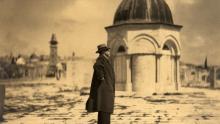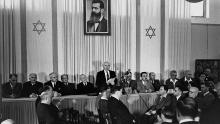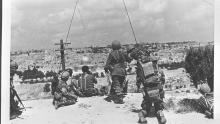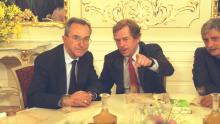Since the re-establishment of diplomatic relations between Israel and Czechoslovakia in February 1990, mutual relations have been very close and economic cooperation has been steadily on the rise. The Czech Republic is one of Israel's strongest allies in the EU.
Tomáš Garrigue Masaryk was the first head of state to visit Mandatory Palestine in 1927. Shortly after its establishment in 1918, Czechoslovakia was one of the few countries to officially recognize Jewish nationality, which stemmed not only from the personal initiative of President Tomáš Garrigue Masaryk, but also from the attitude of the Czech intelligentsia, which due on their own experience of the struggles for national recognition sympathized with the efforts of the Jews to realize their goals. The support that these activities enjoyed from the Czechoslovak state is also evidenced by the fact that the World Zionist Organization congresses in 1921 and 1923 were held in Karlovy Vary and in 1933 in Prague.
After the Second World War, Czechoslovakia actively supported the establishment of Israel. In 1947, it had a representative in the UN Special Committee for Palestine which recommended the division of British Mandate Palestine into a Jewish and an Arab state. From January 1948, Czechoslovakia was also represented in the Committee for Palestine which monitored the partition. The State of Israel was proclaimed on May 14, 1948, and the Czechoslovak government recognized it five days later. In July 1948, diplomatic relations were established.
In the first days of the existence of the new state, Czechoslovakia provided material aid to Israel, despite the UN embargo on the import of weapons to the Middle East. The first shipment of weapons went there already in January 1948. By November 1948, 80 aircraft had arrived in Israel. Czechoslovakia provided training on its territory to about 200 Israeli specialists, pilots and paratroopers.
With the beginning of the Cold War, mutual relations began to cool. In May 1949, Foreign Minister Moshe Sharett came to Prague, and in March 1950, a mutual economic agreement was signed, Israel's first ever trade agreement with a foreign country. However, it was annulled as early as 1951. Following the anti-Semitic wave sweeping Czechoslovakia between 1952 and 1953, the then Israeli ambassador Arieh Kubovi had to leave the country at the end of 1952, and only an authorized representative remained in Czechoslovakia until 1967. All contacts between Israel and Czechoslovakia were cut off at the initiative of the Czechoslovak side in June 1967 after the Six Day War.
Until 1989, Czechoslovakia, as the only country besides the USSR, did not allow Israeli citizens to enter its territory. The exception was the arrival of the Israeli tennis team in 1987. Economic contacts began to revive in the second half of the 1980s. Diplomatic relations at the embassy level were restored on February 9, 1990 during the visit of Israeli Foreign Minister Moshe Arens to Czechoslovakia and started a new era of development of comprehensive cooperation. President Václav Havel, as the first supreme representative of the states of Central and Eastern Europe, paid an official visit to Israel in April 1990. Israeli President Haim Herzog came for a reciprocal visit in October 1991. Diplomatic relations with the Czech Republic were established on January 1, 1993.
Since the re-establishment of diplomatic relations between Israel and Czechoslovakia in February 1990, mutual relations have been very close and economic cooperation has been steadily on the rise.
The Czech Republic is one of Israel's strongest allies in the EU. Czech diplomacy advocates a peaceful solution to the Middle East conflict, and during its presidency of the EU in 2009 and 2022, the Czech Republic sought closer relations between the union and Israel.

In the spring of 1927, President Tomáš Garrigue Masaryk arrived in the Holy Land to visit the Yishuv - the Jews living in the Land of Israel. It was historically the first visit of the official head of state to the Mandatory Palestine.

The Czechoslovak government recognized Israel's independence 5 days after it had been announced, i.e. on May 19, 1948. Diplomatic relations between the countries were oficially established on July 3, 1948.

After the Six-Day War, communist Czechoslovakia together with the entire Soviet bloc (with the exception of Romania) broke off diplomatic relations with Israel.

Diplomatic relations were restored only on February 9, 1990, after the fall of the communist regime in Czechoslovakia. Mutual relations are at their best today, as evidenced by the high frequency of mutual political contacts, the increasing dynamics of economic exchange and a rich network of activities at the non-governmental level.
The main initiator of the new approach of Czechoslovakia towards Israel after the fall of the Iron Curtain was Václav Havel. He pledged to re-establish diplomatic relations with Israel already in his first speech as a Czechoslovak president, on New Year´s Day 1990, a promise fulfilled the following month. At the beginning of February 1990 V. Havel met then-Deputy Prime Minister S. Peres to prepare the way for the historic agreement which was signed in Prague on February 9, 1990 by the Foreign Ministers Jiří Dienstbier and Moshe Arens. The reestablishment of diplomatic relations between Czechoslovakia and the State of Israel brought definitely the anti-Israeli policy of the former socialist countries to an end. In April of that year, Havel became the first leader of a free former Soviet bloc country to visit Israel. It was a groundbreaking event in the Czechoslovak – Israeli relations. On the trip he brought with him 180 Czech Jews and demonstrated the close ties between the both nations which he developed also in the following years. V. Havel offered Czechoslovakia as a transit country for soviet Jews immigrating to Israel, opposed the sale of weapons to regimes hostile to Israel and always spoke forcefully against anti-Semitism in Europe and in the world.

The Czech Republic supported Israel from the very first hours after the massacre on October 7, when Israel was attacked by Hamas terrorists in the greatest tragedy to hit the Jewish people since the Holocaust. Support came from both all the leaders of the country, starting with the Prime Minister, President, Foreign Minister, heads of the Chamber of Deputies and the Senate, Minister of Defense, Minister of the Interior and the public. Central buildings were lit up in blue and white colors and many Israeli flags were flown at state, academic and cultural institutions.
Foreign Minister Jan Lipavský was the first foreign representative to visit Israel already on the third day of the war (10.10), followed by many others, including Prime Minister Petr Fiala, Speaker of the Chamber of Deputies Markéta Pekarová Adamová and President of the Senate Miloš Vystrčil, Minister of Defense Jana Černochová, many notable MPs and, last but not least, President Petr Pavel at the beginning of 2024.
